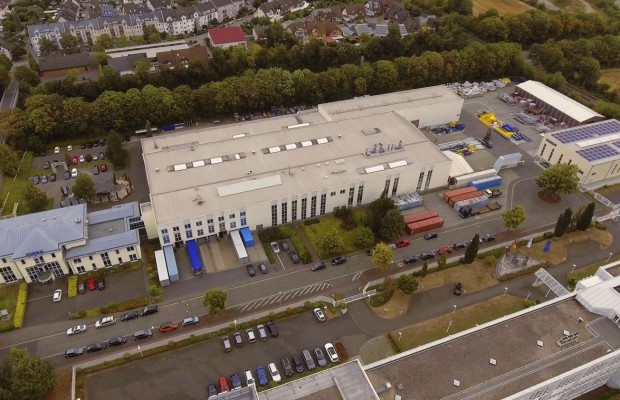Environmental protection and sustainability
Masa successfully implements measuresAndernach/Porta Westfalica 23 mar 2022 - Social responsibility, economic performance and environmental protection are inseparable in the sense of the basic idea of sustainable production. Masa had the energy consumption and consumers at the Andernach and Porta Westfalica sites systematically recorded, analyzed and evaluated. Masa then implemented the catalog of measures derived from this.
The manufacture of economical machines and production plants with long life cycles and a long service life is a living reality for us. This very effective form of sustainability, the long-term use of goods in conjunction with high manufacturing quality, has always determined the global mission statement of the mechanical engineering company. The permanent further development of plant concepts and the use of modern drive and control technology enable our customers to manufacture their products in a resource-conserving and energy-efficient way. However, the company also focuses on sustainability in the preceding, in-house production of Masa machines and the associated activities.
One of the cornerstones for Masa is a large domestic value-added share, which is achieved at the two German production sites in Andernach and Porta Westfalica with products of consistently high quality and in compliance with demanding occupational safety standards.
We also see a great opportunity to go beyond the guidelines for achieving the European energy and climate protection targets, to implement sustainable processes in the company and to continuously subject our own products to further energy optimization. Energy audits are used to systematically and transparently record, analyze and evaluate energy consumption and energy consumers. With the subsequent identification and implementation of various economic energy efficiency measures, we strengthen our energy productivity and thus our own competitiveness. In addition, Masa sensitizes its employees with regard to energy efficiency.
Building and energy concept
- Both in Andernach and in Porta Westfalica, wall and roof areas were subjected to extensive energy refurbishment measures. The photovoltaic system installed on the building of the spare parts hall in Andernach with two solar inverters and a connected load of 25-27 kWp each has been in operation since 2017 and covers the hall's entire electricity requirements. The potential in Porta Westfalica for a further photovoltaic system has already been recorded in this context, as have further renovation options for roof surfaces and windows.
- The production halls at both sites were equipped with a daylight and time control system, and the company also gradually converted the lighting in both the office buildings and the production areas to LED technology. Motion detectors in corridors and stairwells also help to save energy. The modernization of boilers and the control of the heating system was also tackled.
- Interestingly, the company's own paint shop offered an opportunity for heat recovery: the extraction system at the Porta Westfalica site was renewed so that up to 65% of the heat from the extracted air can be recovered through the use of a rotary heat exchanger. This saves annual heating costs of over €10,000 and correspondingly also CO2. Plans are also already underway for Andernach.
More environmentally friendly mobility
- The update of the cross-site company car policy cleared the way for the switch to low-emission e-mobility. 6 charging stations with a total of 12 charging points were put into operation in Andernach in 2021 to supply the company vehicles with electricity. If required, the charging stations can also be used by the workforce. The charging stations in Porta Westfalica will also be installed shortly.
- We also support our own employees in switching to bicycles: Since 2021, the company has been participating in the company bike leasing model, thus promoting the investment of employees in an environmentally friendly and health-promoting means of transportation.
- Energy recovery also plays a role in mobility at the plant: When purchasing new forklift trucks, preference is given to models that use regenerative braking to return up to 30 percent of the energy to the battery.
Waste reduction/circulation/recycling
- Both the reduction and avoidance as well as the management of waste generated came into focus at Masa. Separate waste collection and disposal is constantly being expanded and optimized, beverage vending machines are being converted to use thermal reusable cups, and disposable pallets are being replaced with reusable pallets. The paper presses installed at both sites compress the waste paper produced, so that the number of trips to disposal companies has been significantly reduced.
- As an alternative to solvent-based lacquers with a high VOC content, water-based lacquers are used in production in Andernach. In Porta Westfalica, conversion to electrostatic lacquering was carried out. This significantly reduced both lacquer consumption and the amount of lacquer waste.
- A pilot project initiated in the electrical sector is pursuing the goal of replacing paper drawings and bills of materials as far as possible by means of increased digitization.
- In administration, too, the increasing digitization of processes and the predominantly digital exchange of invoices with customers and suppliers have led to a significant reduction in paper consumption.
CONCLUSIONS:
The aforementioned measures exemplify our efforts to make the production of machinery more resource-conserving and energy-efficient. In the future, too, we will not lose sight of the goal of "CO2-neutral production" when modernizing and acquiring new equipment, as evidenced, for example, by the current modernization of the compressor system, which has resulted in energy savings of around 30%.

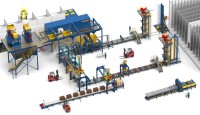 Es un trabajo de largo recorrido desde las materias primas, pasando por la mezcla hasta al bloque de hormigón final. En este proceso participan muchos componentes. Solo si se coordinan las partes de la instalación, se garantizará un proceso sin problemas y buen rendimiento económico de la equipo de fabricación de prefabricados de hormigón.
Es un trabajo de largo recorrido desde las materias primas, pasando por la mezcla hasta al bloque de hormigón final. En este proceso participan muchos componentes. Solo si se coordinan las partes de la instalación, se garantizará un proceso sin problemas y buen rendimiento económico de la equipo de fabricación de prefabricados de hormigón.
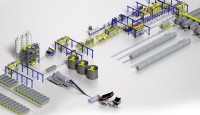 La fabricación de hormigón celular autoclavado impone altas exigencias en el tratamiento y dosificación de la materia prima, la supervisión del proceso de fraguado y el control de todas las fases de fabricación. Las instalaciones de fabricación de hormigón celular autoclavado de Masa se han perfeccionado a nivel técnico y se han concebido según las exigencias individuales de nuestros clientes. De esa forma son soluciones completas, que garantizan operaciones de procesos optimizados y muy económicos con una calidad constante del producto final.
La fabricación de hormigón celular autoclavado impone altas exigencias en el tratamiento y dosificación de la materia prima, la supervisión del proceso de fraguado y el control de todas las fases de fabricación. Las instalaciones de fabricación de hormigón celular autoclavado de Masa se han perfeccionado a nivel técnico y se han concebido según las exigencias individuales de nuestros clientes. De esa forma son soluciones completas, que garantizan operaciones de procesos optimizados y muy económicos con una calidad constante del producto final.
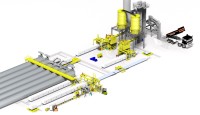 Es un trabajo de largo recorrido desde las materias primas, pasando por la mezcla hasta la piedra final. En este proceso participan muchos componentes. Es necesario que las partes de la planta estén armonizadas entre sí para garantizar un funcionamiento sin contratiempos y rentable de la de planta de producción de ladrillo de arena y cal.
Es un trabajo de largo recorrido desde las materias primas, pasando por la mezcla hasta la piedra final. En este proceso participan muchos componentes. Es necesario que las partes de la planta estén armonizadas entre sí para garantizar un funcionamiento sin contratiempos y rentable de la de planta de producción de ladrillo de arena y cal.
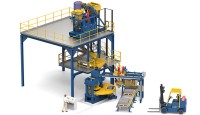 El camino que va de la materia prima, pasando por la mezcla, hasta llegar al bloque (o bordillo) final es largo. Las prensas de bordillos Masa han sido desarrolladas para cumplir, entre otros, los requisitos especiales de «British Standard» para los bordillos. Esta norma «British Standard» se aplica aún hoy en el Reino Unido y en ciertos países de Oriente Medio.
El camino que va de la materia prima, pasando por la mezcla, hasta llegar al bloque (o bordillo) final es largo. Las prensas de bordillos Masa han sido desarrolladas para cumplir, entre otros, los requisitos especiales de «British Standard» para los bordillos. Esta norma «British Standard» se aplica aún hoy en el Reino Unido y en ciertos países de Oriente Medio.
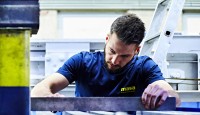 Las instalaciones y maquinaria de Masa se instalan y se ponen en marcha por parte de nuestros propios y experimentados montadores. De esta forma, Masa apuesta por personal especializado cualificado y formado en Alemania.
Las instalaciones y maquinaria de Masa se instalan y se ponen en marcha por parte de nuestros propios y experimentados montadores. De esta forma, Masa apuesta por personal especializado cualificado y formado en Alemania.
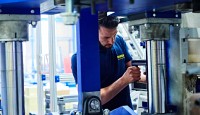 El servicio lifetime Masa va mucho más allá del montaje y la puesta en marcha de una instalación. Masa hace uso del conocimiento específico y la experiencia industrial de más de 110 años de servicio.
El servicio lifetime Masa va mucho más allá del montaje y la puesta en marcha de una instalación. Masa hace uso del conocimiento específico y la experiencia industrial de más de 110 años de servicio.
 ¿Necesita ayuda con su máquina? El Servicio Técnico de Masa destaca tanto por la calidad como por su accesibilidad notablemente mejorada. Ya se trate de "primeros auxilios" en el caso de problemas técnicos, actualizaciones, ampliaciones de funciones o consultas técnicas, el conocimiento del que disponemos en el marco del Servicio Técnico de Masa cubre una amplia gama de prestaciones.
¿Necesita ayuda con su máquina? El Servicio Técnico de Masa destaca tanto por la calidad como por su accesibilidad notablemente mejorada. Ya se trate de "primeros auxilios" en el caso de problemas técnicos, actualizaciones, ampliaciones de funciones o consultas técnicas, el conocimiento del que disponemos en el marco del Servicio Técnico de Masa cubre una amplia gama de prestaciones.
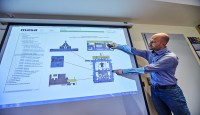 Una de las claves para el aumento tanto de la calidad como de la productividad es la formación continua de los operarios de la maquinaria y del personal de mantenimiento.
Una de las claves para el aumento tanto de la calidad como de la productividad es la formación continua de los operarios de la maquinaria y del personal de mantenimiento.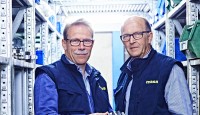 ¿Busca un interlocutor o un contacto? Le presentamos al Equipo de Servicio de Masa.
¿Busca un interlocutor o un contacto? Le presentamos al Equipo de Servicio de Masa.
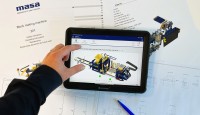 Masa Service Cloud es la última incorporación a la familia de productos digitales.
Masa Service Cloud es la última incorporación a la familia de productos digitales.
